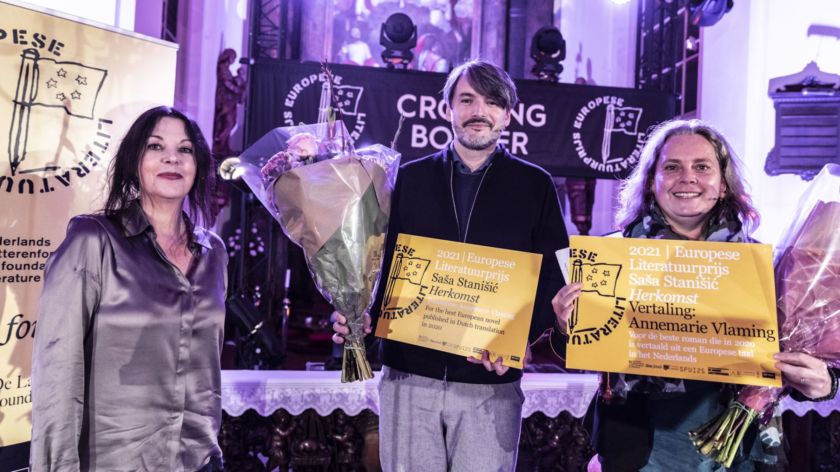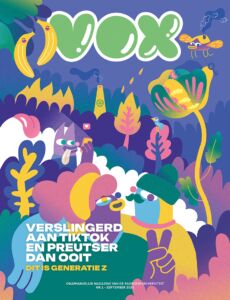-
 Saša Stanišić and Annemarie Vlaming. Photo: Letterenfonds
Saša Stanišić and Annemarie Vlaming. Photo: Letterenfonds
For her Dutch translation of the novel ‘Where You Come From’ by Bosnian-German author Saša Stanišić, Radboud Alumna Annemarie Vlaming has won the European Literature Prize 2021. ‘As a translator, you’re mainly subservient to the writer.’
For eight months, literary translator Annemarie Vlaming worked on the Dutch translation of Where You Come From (Du: Herkomst; original: Herkunft), a novel by Bosnian-German author Saša Stanišić about his grandmother who suffered from dementia. The large amount of work has proven to be quite beneficial to Vlaming: one and a half weeks ago, the alumna of German Language and Culture received the European Literature Prize for her translation.
Vlaming says that Where You Come From was quite a difficult book to translate. The two most important themes, heritage and dementia, affect her on a personal level. ‘I miss my birthplace of Texel, and during this period I would like to be there for my parents at all hours’, she says.
Heavy Subjects
Of course, Vlaming does not want to compare her ‘suffering’ with that of Stanišić. Together with his family he just barely managed to flee the war in Yugoslavia, thus landing him in the then unfamiliar Germany in 1992.
‘Stanišić has the talent to write about incredibly heavy subjects in a light-hearted way’, according to Vlaming. ‘As a translator you have to delve into horrible subjects, in this case the war in former Yugoslavia; after all, you can’t just skip the nastier parts. In fact: after translating you will reread the text countless times, so you have to go through it again and again.’
What kind of author is Saša Stanišić?
“He is an incredibly original writer, who likes to play around with language and genres, and who doesn’t care about literary convention. You can tell that he came from a different language area, originally; he lived in Bosnia until he was fourteen. He very quickly mastered German in his own peculiar way. I think that is what makes his works so playful and light-hearted. Besides that, he is extraordinarily kind and funny, and he has a big and idealistic heart, which you can tell from his Twitter profile, for example. He also has a lot of respect for his translators; he notices us and appreciates our work, and he thinks it’s fine if we some necessary liberties in our work.’
‘You can tell that Stanišić came from a different language area’
Were you in frequent contact with Stanišić over the course of translating the book?
‘No. When I was nearly done translating his first book (How the Soldier Repairs the Gramophone, ed.), I received an email from Saša via his publisher, asking me why he hadn’t received any questions; all the other translators had sent him a list of questions. I just don’t have a lot of questions; I like to puzzle and ponder over what the writer might have meant. The Goethe-Institut organised a kind of online translators’ conference in South-Korea for Herkunft, for all the translators around the world who were working on the book. That allowed us to ask a lot of questions and help each other.’
Is a translation still the same book as the original, or does it become a whole new book?
‘Without the original there can’t be a translation, and without the translation the author’s audience is a lot more limited. But as a translator I’m mainly subservient to the author. They did the heavy lifting, after all; my job is to bring their work to new shores. I have loosened up a lot in my work: I allow myself to take more liberties when translating if I think it will improve the book. Therefore, a translation is the same book as the original, only opened up to a larger audience.’
Do literary translators receive enough appreciation for their work?
‘You certainly feel appreciated if you win a prize like the European Literature award – or even just if you’re long- or shortlisted- but this rarely ever happens. The job also doesn’t pay very well, and sometimes the translator’s name is not even mentioned in reviews.’
‘Sometimes the translator’s name is not even mentioned in reviews’
‘Fortunately I’ve been translating nothing but literary works for year, which usually means I can apply for a project grant with the Dutch Foundation for Literature. That kind of grant gives you the financial muscle and space to keep doing what you’re good at, which I consider a kind of appreciation.’
You studied German language and Culture at the Radboud University from 1993 to 1999. When did you decide to become a literary translator?
‘The first few years I was just messing around. I liked the German programme and had a lot of fun, but I wasn’t very focused. I enjoyed the specialisation Literary Translation because translating text is a wonderfully practical exercise. You have a text in one language, which you turn into a text in a different language; you have some freedom within that framework.’
What do you plan to do with the prize money?
‘I really enjoy cycling. For the longer distances -such as between my home in Rhenen and Nijmegen- I would like to buy a quality e-bike. I’ve pretty much already spent half of what’s left on fun dinner parties and gifts (laughs).’
You can find out more information on ‘Where You Come From’ and the European Literature Award using this link.
Jury Report
“Translator Annemarie Vlaming unfailingly conveys these leaps and this lightness from the German”, according to the jury report from the European Literature award. “The astute plays on words and rapid, pointed, thoroughly unique use of language coincide effortlessly with the story, and the narration maintains its natural tone consistently in the Dutch.”
‘It’s exactly those things the jury report mentions that make my wok so wonderfully interesting,’ translator Annemarie Vlaming says. ‘Puzzling, tinkering, and searching. Although there were plenty of difficult parts in Stanišić’s text. For example, he frequently cites old German poets such as Joseph van Eichendorff and Friedrich Hölderlin. That means you have to find out if those poems have every been translated before. Otherwise you have to do it yourself, which does not always come naturally to a translator of prose.’



